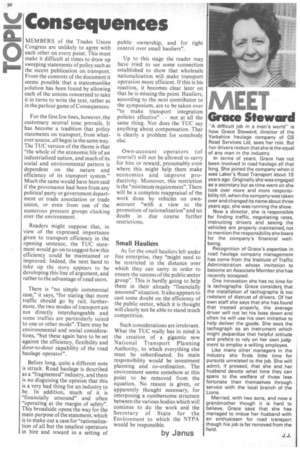Consequences
Page 58

If you've noticed an error in this article please click here to report it so we can fix it.
MEMBERS of the Trades Union Congress are unlikely to agree with each other on every point. This must make it difficult at times to draw up sweeping statements of policy such as the recent publication on transport. From the contents of the document it seems possible that a statesmanlike cilution has been found by allowing each of the unions concerned to take it in turns to write the text, rather as in the parlour game of Consequences.
For the first few lines, however, the customary neutral tone prevails. It has become a tradition that policy statements on transport, from whatever source, all begin in the same way. The TUC version of the theme is that "the whole of the economic life of an industrialized nation, and much of its social and environmental pattern is dependent on the nature and efficiency of its transport system." Much the same would have been said if the provenance had been from any political party or government department or trade association or trade union, or even from one of the numerous pressure groups clucking over the environment.
Readers might suppose that, in view of the expressed importance given to transport efficiency in the opening sentence, the TUC statement would go on to suggest how this efficiency could be maintained or improved. Indeed, the next hand to take up the story appears to be developing this line of argument, and rather to the advantage of road users.
There is "no simple commercial case," it says, "for stating that more traffic should go by rail; furthermore, the two modes of transport are not directly interchangeable and some traffics are particularly suited to one or other mode". There may be environmental and social considerations, "but these again have to be set against the efficiency, flexibility and door-to-door capability of the road haulage operator".
Before long, quite a different note is struck. Road haulage is described as a "fragmented" industry, and there is no disguising the opinion that this is a very bad thing for an industry to be. In addition, much of it is "financially unsound" and often "operating at the margin of safety". This broadside opens the way for the main purpose of the statement, which is to make out a case for "rationalization of all but the smallest operators in hire and reward in a setting of public ownership, and for tight control over small hauliers-.
Up to this stage the reader may have tried to see some connection established to show that wholesale nationalization will make transport operation more efficient. If this is his reaction, it becomes clear later on that he is missing the point. Hauliers, according to the next contributor to the symposium, are to be taken over "to make transport integration policies effective" -not at all the same thing. Nor does the TUC say anything about compensation. That is clearly a problem for somebody else.
Own-account operators (of course!) will not be allowed to carry for hire or reward, presumably even where this might help them make economies and improve productivity. Moreover, this restriction is the "minimum requirement". There will be a complete reappraisal of the work done by vehicles on ownaccount "with a view to the promotion of rationalization" and no doubt in due course further restrictions.
Small Hauliers
As for the small hauliers left under free enterprise, they "might need to be restricted in the distance over which they can carry in order to ensure the success of the public sector group". This is hardly going to help them in their already "financially unsound" situation. It also appears to cast some doubt on the efficiency of the public sector, which it is thought will clearly not be able to stand much competition.
Such considerations are irrelevant. What the TUC really has in mind is the creation of a gigantic new National Transport Planning Authority, to which everything else must be subordinated. Its main responsibility would be investment planning and co-ordination. The environment seems somehow at this point to be removed from the equation. No reason is given, or apparently thought necessary, for interposing a cumbersome structure between the various bodies which will continue to do the work and the Secretary of State for the Environment to which the NTPA would be responsible.
by Janus








































































































